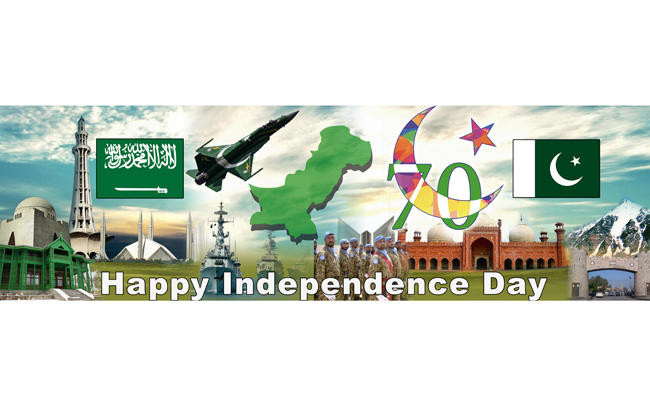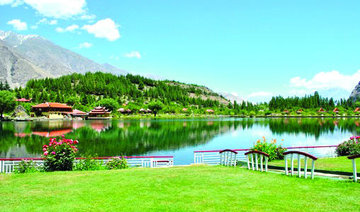We are living in challenging times, as the contemporary global geopolitical landscape remains highly complex and uncertain. Peace and stability remain elusive across large swaths of the world.
The era of perpetual violence triggered in the aftermath of the 9/11 terror attacks shows no signs of abating anytime soon. The world is beset with numerous conflicts resulting in unprecedented human tragedy and socioeconomic problems of epic proportions.
Many Muslim countries are especially affected due to the proximity of these simmering disputes. In the backdrop of this strategic flux, both Pakistan and Saudi Arabia have stood by each other steadfastly. Custodian of the Two Holy Mosques King Salman and the leadership in Pakistan continue to make untiring efforts to promote peace and stability across the world in general and the region in particular.
As we mark 70 years of independence, we are proud that despite some challenging times Pakistan is well on the road to progress and prosperity. From a very humble beginning, we now occupy an important place in the comity of nations arguably one of the leading Muslim states in the world.
Pakistan has successfully spearheaded the campaign against terrorism for over a decade now. Our valiant armed forces and law-enforcement personnel have proven their courage and sagacity.
The general population across the length and breadth of the country too has been resolute and brave to counter the menace. Nearly 60,000 Pakistanis have embraced martyrdom while the loss to national economy runs into billions of dollars. As a nation, we stand at the cusp where flushing out of the remnants of these brutal elements is nearing completion. Let no one doubt our quest and sincerity for lasting peace and stability in the region particularly in our neighborhood.
We shall continue to partake in international efforts to bring about peace and value their assistance to restore normalcy in Pakistan.
Pakistan and Saudi Arabia’s relations are rooted in history as the two countries signed a treaty of friendship back in 1951, laying the basis for cooperation. We are bonded in strong fraternal relations, which reflect trust and common aspirations of the people.
Over the past several decades, the two sides have strengthened their brotherly relations in all fields. Both the countries staunchly support each other at international forums. The regular exchange of high-level visits between the two countries is a clear manifestation of our valued ties with the Kingdom. The trend continues and in 2017 alone the prime minister of Pakistan visited Saudi Arabia twice for an exchange of views at the highest level.
The bedrock of Pak-Saudi relations is indeed exceptional defense and security collaboration between the two countries. Decades-old ties are all encompassing which include training, joint exercises, high-level visits, maintenance support, port calls etc. A number of officers and men have benefited from the defense and security cooperation. Saudi Arabia and Pakistan have also shared expertise and experience to combat terrorism and deal with extremism. The cooperation is expanding steadily exploring new vistas in the context of the emerging security paradigm.
Another indicator of the importance of Pak-Saudi relations is the highest regard by their nationals for each other. In fact, Pakistanis consider Saudi Arabia their second home. Saudi Arabia hosts some 2.6 million Pakistanis, most of whom are employed as technicians, semi-skilled and unskilled workers. There are many highly qualified doctors, engineers, financial advisers, IT experts and bankers who are highly respected for their professionalism. The Pakistani diaspora is proud to have made tremendous contributions to the development of Saudi Arabia over the past many years.
The funds remitted by these expatriates contribute significantly to our national economy. I am confident with the transformation of the Saudi economy as envisaged in Saudi Vision 2030, there will be more opportunities for qualified professionals from Pakistan.
Although the economic ties between Saudi Arabia and Pakistan remain strong, there is a considerable scope for expansion. The total bilateral trade with Saudi Arabia hovers around $2.5 billion.
Both countries have immense potential to increase trade significantly. Efforts are being made to improve trade by organizing regular trade shows, exhibitions, and exchange of business communities visits.
An aspect that needs serious attention is the level of investment despite promising opportunities. I am confident both the countries will utilize the Vision 2030 and the China-Pakistan Economic Corridor (CPEC) for mutual benefits.
I can anticipate a brighter future once the CPEC becomes operational, which could serve as a conduit to facilitate trade between Saudi Arabia and China. Public and private investments in export and industrial zones along the corridor would indeed be a boon.
Saudi Arabia is a revered destination for Pakistanis, as every year hundreds of thousands of Pakistanis visit Saudi Arabia to perform Umrah and Hajj. During 2016, Pakistan topped the list of Umrah pilgrims as around 1.4 million pilgrims from Pakistan visited the Kingdom.
The visitors greatly appreciate the top-class arrangements made by the Saudi government to facilitate the pilgrims.
We are also pleased to receive thousands of Saudi nationals wishing to visit Pakistan for different purposes, ranging from investment to tourism. Pakistan also offers one of the best quality and affordable medical facilities in the world to various foreign nationals including from Saudi Arabia.
Pak-Saudi relations are truly unique and unmatched that have withstood the test of time. The spiritual attachment to this holy land and high esteem accorded to the custodian of the two holy mosques by the people of Pakistan mean that the bond is concrete and eternal.
People of Pakistan remain indebted to the leadership of Saudi Arabia for their help in difficult times. Pakistan is committed to the sovereignty and territorial integrity of Saudi Arabia. I, as the ambassador of Pakistan, hope to carry forward the mission of further strengthening cooperation with Saudi Arabia, especially in commerce and culture for the mutual benefit of our two peoples. May Allah bless the two nations with peace, prosperity and infinite bounties.
• The writer is the ambassador of Pakistan to Saudi Arabia.
Strategic partners in peace and development
Strategic partners in peace and development

New platform, pavilion inaugurated at Prophet’s biography museum in Madinah

RIYADH: A new pavilion and an interactive digital platform have been inaugurated at the International Fair and Museum of the Prophet’s Biography and Islamic Civilization in Madinah.
The new additions to the museum were inaugurated by Prince Salman bin Sultan, Governor of Madinah, in the presence of Mohammad Al-Issa, Secretary-General of the Muslim World League and Supervisor-General of the museum.
The new pavilion offers a documented presentation of Madinah through more than 20 sections, covering the most important historical, cultural, and social monuments and landmarks of the holy city during the era of the Prophet Muhammad.
It also includes a panorama of the Prophet's Chamber and presents a simulation of the construction of the Prophet's Mosque, the Prophetic medicine tent, and the Prophet's daily routine.
Ethaf, the new digital platform, allows visitors to explore the Prophet’s biography through virtual tours, with access to a library of over 350 books and encyclopedias in the service of the Holy Qur’an and the Prophetic Sunnah, translated into several languages.
The governor also visited the pavilion showcasing the Kingdom's efforts in serving Qur’an, Sunnah, and the Two Holy Mosques, and was briefed on its work and efforts to highlight the message of Islam.
Saudi aid agency and UK government sign $10m agreement for cholera response in Yemen

- KSrelief will provide $5m to the WHO, while the UK government will provide a further $5m to the UN Children’s Fund
- An estimated 3.5m people will benefit from the deal to fund a wide range of disease management and prevention services
LONDON: Saudi aid agency KSrelief and the UK’s Foreign, Commonwealth and Development Office on Monday signed an agreement to expand cholera response efforts in Yemen, potentially benefiting an estimated 3.5 million people.
KSrelief will provide $5 million to the World Health Organization, while the UK government will provide a further $5 million to the UN Children’s Fund. The money will help support emergency cholera-response activities in Yemen’s worst-affected provinces.
The WHO will deliver a range of services to tackle cholera, including leadership and coordination expertise, disease surveillance, rapid-response teams, and management of cases. KSrelief will assist these efforts through infection-prevention and control efforts, water sanitation and hygiene improvements, risk communication, community engagement, and oral cholera-vaccination campaigns.
The UK funding will be used to tackle water sanitation, hygiene, and health interventions in the most contaminated and high-risk areas.
The agreement was signed in London by Abdullah Al-Rabeeah, supervisor general of KSrelief, and Jenny Chapman, minister of state for international development at the Foreign Office, during the former’s official visit to the UK.
Saudi interior ministry announces penalties for unauthorized Hajj Pilgrims and facilitators

- Penalties will apply from Tuesday until approximately June 10
RIYADH: Saudi Arabia’s Ministry of Interior has announced penalties for individuals who violate Hajj permit regulations and those who facilitate such violations.
The ministry said the following penalties would apply from Tuesday until approximately June 10.
A fine of up to SR20,000 ($5,331.43) will be imposed on individuals caught performing or attempting to perform Hajj without a permit, and on holders of all types of visit visas who attempt to enter or stay in Makkah city and the holy sites during the specified period.
A fine of up to SR100,000 will also be imposed on anyone who applies for a visit visa for an individual who has performed or attempted to perform Hajj without a permit, or who has entered or stayed in Makkah city and the holy sites during the specified period. The fine will multiply for each individual involved.
The same fine will apply to anyone who transports or attempts to transport visit visa holders to Makkah city and the holy sites during the specified period, as well as to those who shelter or attempt to shelter visit visa holders in any accommodation, including hotels, apartments, private housing, shelters, or housing sites for Hajj pilgrims.
This includes concealing their presence or providing assistance that enables their stay. The fine will multiply for each individual sheltered, concealed, or assisted.
A separate penalty would also apply to illegal infiltrators attempting to perform Hajj, whether residents or overstayers, and the guilty parties would be deported to their countries and banned from entering the Kingdom for ten years.
Lastly, the ministry said the relevant court will be requested to confiscate land vehicles used to transport visit visa holders to Makkah city and the holy sites during the specified period, if owned by the transporter, facilitator, or any accomplices.
Turning a dream into reality: retired Saudi teacher copies Qur’an by hand in inspiring journey

- Al-Zahrani shared with Arab News that the experience was both demanding and humbling, requiring exceptional precision and unwavering concentration, as copying the Qur’an allowed no margin for error
MAKKAH: In an era of rapid technological change and evolving traditions, some individuals still embody steadfast devotion to craftsmanship and the quiet power of creativity.
Among them is retired teacher Khaled Al-Zahrani, who turned his retirement into a journey of fulfillment by realizing a dream he had cherished since his college days — copying the entire Holy Qur’an by hand in his own script.
Al-Zahrani, who is nearly 60, has a lifelong passion for Arabic calligraphy, especially the naskh and ruq’ah scripts. He had dreamed of hand-copying the Holy Qur’an since his university days. However, the demands of work and daily life postponed his ambition until retirement gave him the opportunity to finally turn his dream into reality.
HIGHLIGHTS
• Al-Zahrani shared with Arab News that the experience was both demanding and humbling, requiring exceptional precision and unwavering concentration, as copying the Qur’an allowed no margin for error.
• He explained that the experience strengthened his bond with the Qur’an, deepening his connection to its message while instilling a profound sense of responsibility toward the sanctity of the words he transcribed.
He explained that his journey truly began when a friend introduced him to the Qur’an by Hand initiative, which provides blank copies of the Qur’an for personal transcription. Inspired, he purchased two copies and embarked on his endeavor.
Al-Zahrani shared with Arab News that the experience was both demanding and humbling, requiring exceptional precision and unwavering concentration, as copying the Qur’an allowed no margin for error.
He carefully transcribed around two or two-and-a-half pages each day, meticulously counting the letters to ensure a balanced layout and to avoid omitting any verses.
He began with Surah Al-Zalzalah as a test of his abilities and, upon completing it, he gained the confidence to move forward, despite the profound sense of awe he felt when starting the lengthy Surah Al-Baqarah.
Al-Zahrani said that he relied on a standard half-millimeter pen and used an eraser or a fine needle to make corrections when needed, although he was meticulous to minimize errors as much as possible.
He explained that he had to devote himself fully to this work, so he decided to seclude himself in his home for six months — avoiding all distractions and social visits — so that he could finish writing the Holy Qur’an in conditions that would help him concentrate and achieve his goal.
Al-Zahrani said that his project remained out of the public eye until a relative filmed him writing and posted the video in a family WhatsApp group. The video quickly went viral, drawing widespread admiration and attention.
He added that while he received numerous requests for media interviews, he chose to delay them until he had fully completed the Qur’an, emphasizing that a task of such significance required unwavering focus and could not afford any distractions.
Al-Zahrani said that his transcription of the Qur’an was far more than an artistic pursuit or personal project: It was a profound spiritual journey that drew him into deep contemplation of God’s verses and their meanings. Every letter he penned resonated within him, as if he were living and interacting with the words themselves.
He explained that the experience strengthened his bond with the Qur’an, deepening his connection to its message while instilling a profound sense of responsibility toward the sanctity of the words he transcribed.
He also expressed the hope that his work would inspire younger generations to reconnect with the art of Arabic calligraphy, not simply as an aesthetic pursuit but as a powerful means of drawing closer to and honoring the Qur’an.
Al-Zahrani believes that his experience taught him profound lessons in patience and perseverance, calling it one of the most meaningful chapters of his life.
He expressed hope that his story would inspire others with long-delayed dreams to take the first step toward realizing them, no matter how late it may seem, proving that with sincere determination, dreams can indeed become reality.
Saudi project clears 1,488 Houthi mines in Yemen

- The demining operations took place in Marib, Aden, Jouf, Shabwa, Taiz, Hodeidah, Lahij, Sanaa, Al-Bayda, Al-Dhale and Saada
RIYADH: Members of Saudi Arabia’s Project Masam removed 1,488 explosive devices from various regions of Yemen last week.
The total included 1,437 unexploded ordnances, 46 anti-tank mines, three anti-personnel mines and two explosive devices, according to a recent report.
Ousama Al-Gosaibi, the initiative’s managing director, said that 490,144 mines have been cleared since the project began in 2018.
The explosives were planted indiscriminately and posed a threat to civilians, including children, women and the elderly.
The demining operations took place in Marib, Aden, Jouf, Shabwa, Taiz, Hodeidah, Lahij, Sanaa, Al-Bayda, Al-Dhale and Saada.
The project trains local demining engineers and provides them with modern equipment. It also offers support to Yemenis injured by the devices.
Teams are tasked with clearing villages, roads and schools to facilitate the safe movement of civilians and delivery of humanitarian aid.





















